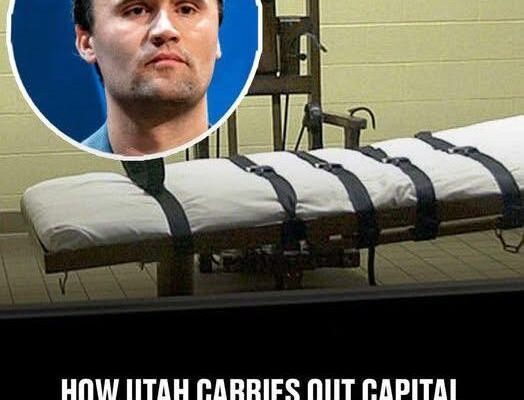The assassination of conservative activist Charlie Kirk has left the nation reeling, plunging Americans into grief, outrage, and a bitter debate over justice. Beyond the immediate shock of his murder at Utah Valley University, the conversation has shifted to Utah’s unique and controversial approach to capital punishment. Unlike most states that rely solely on lethal injection, Utah remains one of the rare jurisdictions where execution by firing squad is still legal. The arrest of Tyler Robinson, the 22-year-old accused of killing Kirk, has thrust this little-discussed reality back into the national spotlight.
The Arrest That Changed the Debate
On September 12, federal and state officials announced Robinson’s arrest. Law enforcement had been under intense pressure to act quickly, and investigators credit a family tip with leading them to crucial evidence linking Robinson to the crime. The alleged shooter had opened fire on a crowded courtyard during Kirk’s speech, a single bullet piercing the chaos and taking Kirk’s life. Nearly 3,000 students and attendees were present, and prosecutors argue that dozens of other lives were placed in danger.
News of Robinson’s arrest spread like wildfire. Within hours, the conversation wasn’t just about who had pulled the trigger—it was about what kind of punishment would be sought.
Former President Donald Trump wasted no time making his stance clear. In a Fox News interview, he declared: “I hope he’s gonna be found guilty, I would imagine, and I hope he gets the death penalty for what he did.” His words reinforced a growing expectation that Utah would pursue capital punishment in a case already soaked in political and cultural symbolism.
Utah’s Distinct Approach to the Death Penalty
While 27 states still allow capital punishment, Utah’s system stands apart. Lethal injection remains the default method, but the state has preserved the firing squad as an alternative. Historically tied to Utah’s frontier past and the influence of early Mormon legal traditions, the firing squad has been defended as swift, transparent, and less prone to the botched complications sometimes seen with lethal injection.
Utah has executed eight people since the U.S. Supreme Court reinstated the death penalty in 1976. Most were by lethal injection. But in 2010, Ronnie Lee Gardner chose the firing squad, reviving global fascination and outrage over a practice many believed belonged to another century. Gardner’s death made headlines around the world, painting Utah as an outlier in the modern landscape of American justice.
When Death Becomes an Option
Under Utah law, not every murder qualifies for the death penalty. Prosecutors must prove aggravated murder, which includes conditions like premeditation, targeting a public figure, or creating great risk of death to others. Robinson’s case appears to check several of these boxes.
Court affidavits suggest prosecutors will argue that his decision to fire into a packed university courtyard wasn’t just an attack on one man but a reckless assault that endangered thousands. Add in Kirk’s status as a nationally recognized political figure, and the criteria for capital punishment seem squarely in play.
A Governor’s Warning
Utah Governor Spencer Cox wasted no time sending a strong message. Standing before reporters, he declared: “We will find you, we will try you, and we will hold you accountable to the furthest extent of the law. And I just want to remind people, we still have the death penalty here in the state of Utah.”
The statement wasn’t just aimed at Robinson. It was a warning to anyone who might think political violence could be tolerated. For Cox, the death penalty remains not just a tool of punishment but a signal of the state’s resolve.
The Political Edge: Trump’s Intervention
Trump’s call for execution underscores how politicized the case has already become. His longstanding support for the death penalty is well documented—he has previously advocated swift executions for terrorists, drug traffickers, and violent offenders. But critics argue that his intervention, made so soon after Robinson’s arrest, risks tainting the judicial process. Public calls for the death penalty from a former president could be seen as prejudicial, putting immense pressure on prosecutors, judges, and jurors.
Supporters, however, see Trump’s words as loyalty to Kirk, a man who often amplified Trump’s message through Turning Point USA and other conservative platforms. To them, demanding the ultimate punishment is an act of justice and solidarity.
Life on Utah’s Death Row
Yet the rhetoric of “swift justice” rarely matches reality. Four men currently sit on Utah’s death row, and none are close to execution. The last execution in the state took place in 2010. Decades of appeals, human rights challenges, and shifting public opinion have slowed the pace dramatically.
One case in particular illustrates the complications. Ralph Menzies, sentenced for a 1986 murder, was scheduled to die by firing squad earlier this year. But the Utah Supreme Court halted the execution after doctors determined his dementia left him incapable of understanding why he was being put to death. His case revealed the collision between legal determination and medical ethics, showing how even the harshest punishments can be delayed indefinitely.
For Robinson, even if sentenced to death, the road would be long and uncertain. Appeals could stretch decades, and the actual likelihood of execution—by lethal injection or firing squad—remains unclear.
Firing Squad vs. Lethal Injection
The debate over Utah’s firing squad law is resurfacing. Opponents call it barbaric, a grotesque throwback that damages America’s human rights reputation. Supporters, however, insist it is more reliable and less cruel than lethal injection, which has sometimes resulted in botched procedures.
Utah law allows the firing squad only in limited circumstances: when lethal injection drugs are unavailable or when the inmate specifically requests it. Still, its existence alone fascinates and horrifies, ensuring that every Utah death penalty case attracts outsized attention.
Broader Implications
The Kirk assassination has become more than a criminal case—it is now a stage for America’s fractured debate on capital punishment. Nationwide, executions have dropped significantly over the past two decades. Some states, including Virginia, Illinois, and Colorado, have abolished the death penalty outright. Others, like Utah, defend its use as a vital tool for justice in the most heinous crimes.
Supporters argue that Robinson’s alleged act—an assassination of a public figure in front of thousands—epitomizes the kind of crime for which the death penalty was designed. Opponents counter that execution does nothing to address the cycle of violence, risks wrongful convictions, and reflects outdated notions of justice.
Final Reflections
Charlie Kirk’s assassination was not only the silencing of a political activist but also a test of the nation’s values. For Utah, the trial of Tyler Robinson could become a defining moment in the state’s criminal justice history, reviving international scrutiny of its firing squad law and forcing residents to confront the uncomfortable realities of capital punishment.
Whether Robinson is convicted, sentenced to death, or left to spend life behind bars, the case will shape the future of Utah’s death penalty. It will also reignite broader national debates about whether executions serve justice or simply prolong cycles of vengeance.
For now, Utah stands in the eye of a storm: a place where tragedy, politics, and history converge, and where the meaning of justice will soon be tested under the harshest possible light.



